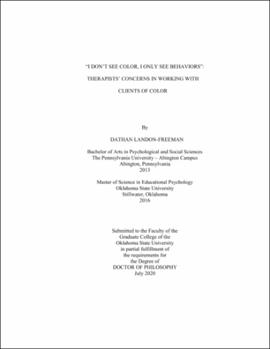| dc.description.abstract | Although there have been significant gains in the field of multicultural counseling, including the development of multicultural competencies for counseling clients of color, the importance of examining the role of therapists' racial attitudes and biases, as they relate to their level of concerns in counseling clients of color, has not received much attention in the multicultural research and counseling literature. Also, cross-cultural psychological capital and its influence on therapists' level of concern in working with clients of color is unknown. These aspects of cross-cultural capital include optimism and hope in working with clients of color, viewing them as resilient individuals, and believing in one's ability to help this group, otherwise known as self-efficacy. The purpose of this study was to explore therapists' general racial attitudes, their use of psychological capital in sessions with clients, and their levels of multicultural competence as potential predictors of their level of concern in working with clients of color in therapy. Therapists recruited from various fields of psychotherapy (e.g., clinical, counseling, school psychology, couples, and family therapists, social workers, counselors) participated in the study. A total of 177 participants completed an online survey, which included a demographic page as well as the following questionnaires: the Mental Health Practitioner's Racial Socialization Practices Measure, the Cross-Cultural Psychological Capital Scale, the California Brief Multicultural Competence Scale, and the Concerns about Counseling Racial Minority Clients Scale. Results indicated that therapists' general racial attitudes, cross-cultural psychological capital, and multicultural competence were significantly and linearly related to their level of concern in working with clients of color. However, cross-cultural psychological capital was the only significant individual predictor of therapists' level of concern in working with clients of color. Thus, helping mental health professionals be more hopeful, optimistic, and self-efficacious with this client population, and feeling resilient in their work with culturally diverse clients will help them feel more comfortable in working with clients of color. | |
